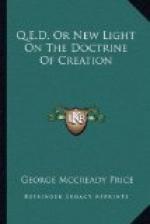The Bible teaches us of a Creation as a definite act, completed at a definite period in the past, and it gives us the Sabbath as the divine memorial of this completed Creation. We have seen how science also points backward along the various diverging lines of the great perspective of the ages to the vanishing point whence they all begin, the birth-day of the world; and we say that thus science confirms the Bible record of Creation. But we also know that when Christ was being examined by the Sanhedrin for healing on the Sabbath, He defended Himself by saying, “My Father worketh hitherto, and I work.” That is, although “the works were finished from the foundation of the world,” and second causes are now largely operative in nature all around us, still there is everywhere manifest an active energy, a presence, an Intelligence, “in Whom we live, and move, and have our being.”
That we cannot comprehend all this, that we cannot set definite boundaries to these seemingly conflicting views, is not at all surprising; for we are but finite.[55] Even His universe partakes so much of His prerogative of infinity that it is utterly beyond the compass of our finite minds. Indeed, if either the Bible or the book of nature contained nothing beyond what we could easily comprehend, would it not diminish our reverence and awe for the One behind them, Whom we now regard as infinite in power and in wisdom?
True, the natural human heart cannot bear this thought of the direct acting throughout nature of the infinite Creator. It brings us too close beneath His gaze in our sinful shortcoming and nakedness.
[Footnote 55: A recent clever writer likens some of these metaphysical speculations to the act of a baby sucking at a nursing bottle. So long as there is any milk in the bottle, the baby sucks with pleasure and profit. Unfortunately the little fellow does not always stop sucking when the supply of milk gives out, but still keeps on sucking empty air, with resulting discomfort and colic. We all need to recognize the limits of the intellectual milk supply, and not keep on trying to solve problems that are in their very nature beyond the limits of the human mind.]
And so men draw the veil of their pantheistic or monistic philosophy over their hearts, to hide them from His all-searching gaze. In ancient times they seem to have done the same, as the monuments of Egypt and Babylonia declare; and the intimate knowledge of Nature and its Creator which they had in the morning of our world, degenerated into the nature worship and polytheism which we find so nearly universal at the first dawn of secular history. It is only the child of God, the redeemed man, who can view without flinching the sublime fact of a direct Creation, or face the other great fact that what we call second causes are not the real causes of natural action, that the ordinary phenomena of light, heat, gravity, vital action, etc., do not occur because certain “properties”




